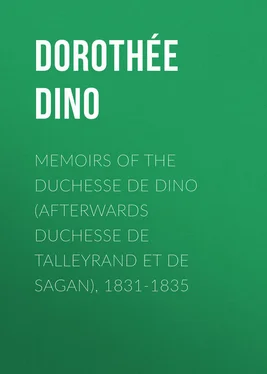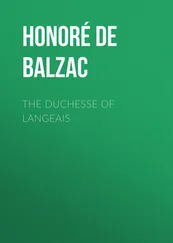Dino Dorothée - Memoirs of the Duchesse de Dino (Afterwards Duchesse de Talleyrand et de Sagan), 1831-1835
Здесь есть возможность читать онлайн «Dino Dorothée - Memoirs of the Duchesse de Dino (Afterwards Duchesse de Talleyrand et de Sagan), 1831-1835» — ознакомительный отрывок электронной книги совершенно бесплатно, а после прочтения отрывка купить полную версию. В некоторых случаях можно слушать аудио, скачать через торрент в формате fb2 и присутствует краткое содержание. Жанр: foreign_antique, foreign_prose, на английском языке. Описание произведения, (предисловие) а так же отзывы посетителей доступны на портале библиотеки ЛибКат.
- Название:Memoirs of the Duchesse de Dino (Afterwards Duchesse de Talleyrand et de Sagan), 1831-1835
- Автор:
- Жанр:
- Год:неизвестен
- ISBN:нет данных
- Рейтинг книги:4 / 5. Голосов: 1
-
Избранное:Добавить в избранное
- Отзывы:
-
Ваша оценка:
- 80
- 1
- 2
- 3
- 4
- 5
Memoirs of the Duchesse de Dino (Afterwards Duchesse de Talleyrand et de Sagan), 1831-1835: краткое содержание, описание и аннотация
Предлагаем к чтению аннотацию, описание, краткое содержание или предисловие (зависит от того, что написал сам автор книги «Memoirs of the Duchesse de Dino (Afterwards Duchesse de Talleyrand et de Sagan), 1831-1835»). Если вы не нашли необходимую информацию о книге — напишите в комментариях, мы постараемся отыскать её.
Memoirs of the Duchesse de Dino (Afterwards Duchesse de Talleyrand et de Sagan), 1831-1835 — читать онлайн ознакомительный отрывок
Ниже представлен текст книги, разбитый по страницам. Система сохранения места последней прочитанной страницы, позволяет с удобством читать онлайн бесплатно книгу «Memoirs of the Duchesse de Dino (Afterwards Duchesse de Talleyrand et de Sagan), 1831-1835», без необходимости каждый раз заново искать на чём Вы остановились. Поставьте закладку, и сможете в любой момент перейти на страницу, на которой закончили чтение.
Интервал:
Закладка:
M. de Montrond writes to M. de Talleyrand to say that he has caused his desire to come to London to be intimated to M. de Rigny, who, before allowing him to go, desires him to make sure whether M. de Talleyrand would like it. M. de Montrond is much annoyed at this obstacle, but I am grateful to M. de Rigny for having raised it. As a matter of fact, last year M. de Montrond professed to be charged with a secret diplomatic mission, and was simply a nuisance. The bad temper he felt and showed when he was not admitted to the secret concerns of the Embassy often made him forget his manners, annoyed M. de Talleyrand and was most unpleasant for everybody. For the last eighteen months M. de Montrond has had the management of a thousand Louis of the Foreign Affairs Secret Service money: I doubt if he ever gives them back the change!
In London all the workmen are in rebellion; the tailors have stopped work for want of hands. It is said that on the cards for Lady Lansdowne's ball there was inscribed: "The gentlemen to appear in their old coats." Now the laundries have caught the infection, and soon we shall have to wash our own linen like the princesses in the Odyssey .
London, May 3, 1834. – M. de Talleyrand speaks with as much truth as wit of the "dangerous benevolence" of Lord Holland. With the most perfect geniality, the most equable temper, the gayest pleasantries, and the most obliging manner in the world, his Lordship is always ready to set light to the revolutionary train, and he feels the greatest annoyance of which he is capable when he is unsuccessful.
Yesterday I dined with Sir Stratford Canning. His house is curious, beautiful, admirably planned and full of souvenirs of Constantinople and of Spain. He himself is full of courtesy and learning; his conversation is witty, and if it were not for a certain contraction of the lips which spoils an otherwise fine face, and for the oppressed air of his wife, one could hardly understand the bad accounts of him which one hears almost everywhere. This, at least, was the pretext on which the Czar refused to receive him last winter as Ambassador at St. Petersburg.
London, May 4, 1834. – Koreff is a braggadocious creature with a vein of indiscreet curiosity which I have sometimes noticed on the Continent, and which here inspires me with the most profound mistrust. His wit and his learning are lost among the bad features of his character, which often make him quite impossible. He lives on gossip of all kinds, public and private, and when he can get nothing else to talk about he talks about medicine. Then he assumes the physician and deifies his art. You hear of patients saved by him when all hope was gone; of his marvellous discoveries, of magnetism, homeopathy true and false, of things natural and supernatural, possible and impossible. Everything serves to magnify his importance, to surround the poor creature with an atmosphere of the marvellous, which covers his want of real dignity.
We had him to dinner with Sir Henry Halford, and I don't think they took to each other. What, indeed, could they have in common? Science perhaps, if by science they both understood the same thing. Sir Henry is a suave and polished person – measured, discreet, supple, and deferential; a perfect courtier, a man of fortune, highly respected, and a great practitioner. He has never sought to be anything to the great but their doctor, and consequently, without seeking it, he has found himself in all family and State secrets. Koreff, on the other hand, poses as a man of letters and a statesman, and has thus made persons in great places chary of having him as their doctor. This was how he came to grief at Berlin; he will find it difficult to regain his ground at Paris, and he won't, in my opinion, be a success in London.
A propos of gossip and indiscreet curiosity, I cannot forget a very true reflection which the Duke of Wellington has just imparted to me on the subject of Alava. "Whoever aims at being in everybody's confidence," said his Grace, "must necessarily give his own confidence to more than one person, and this he usually does at some one else's expense." The Duke's honest commonsense is admirable. I had a long talk with him to-day at dinner, and I should like to remember everything he said. Truth and simplicity are becoming so rare that one is anxious to gather up the crumbs.
The Duke of Wellington's memory is very sure. He never quotes inexactly; he forgets nothing and never exaggerates; and if there is something a trifle abrupt, a little dry and military in his conversation, what he says is nevertheless attractive owing to its naturalness, its fairness, and the perfect good manners with which he says it. His manners are indeed excellent, and a woman has never to be on her guard against a conversation taking an awkward turn. In this respect he is much more reserved than Lord Grey, though in many ways the latter's education is more elaborate and his intelligence more cultivated than the Duke's.
The Duke of Wellington made a rather striking remark to me about the English character, to the effect that no people have a greater hatred of crimes of violence. In England a murder is discovered with the greatest promptitude. Every one helps to discover the assassin; tracks him out and denounces him, and is eager that justice should be done. He assured me that the English soldier is the least cruel in the world, and that once a battle is over he hardly ever commits deeds of violence. He is a great robber, no doubt, but not a murderer.
The excessive and naïve vanity of Lady Jersey, which amuses the Duke, led us to talk of Madame de Staël, with whom he was well acquainted, and whose absurd pretensions struck him as much as her wit and eloquence dazzled him. Madame de Staël, who wished to appear to his Grace in every character – even in the most feminine – observed one day that what she liked most in the world to hear was a declaration of love. She was so elderly and so ugly that the Duke could not help replying, "Yes, when you can be sure that it is genuine."
Lady Londonderry, who is celebrated for her eccentricities, being near her time, and certain she would have a son, has ordered a little hussar costume – the uniform of her husband's regiment. When she was ordering it she told the tailor that it was for a child six days old. "Your ladyship means six years?" replied the tailor. "No, indeed," answered Lady Londonderry; "six days; it is for his baptism!"
In the last years of George IV. the Duke of Cumberland enjoyed a good deal of his favour. Yet it was then that the King said, in reply to the Duke of Wellington's inquiry why H.R.H. was so universally unpopular: "It is because there are no lovers, no brothers and sisters, no friends, whom the Duke of Cumberland would not set by the ears if he came among them." It is said, however, that the Duke is no fool, but so cross-grained that he spoils everything he touches.
The Queen's approaching departure for Germany is causing anxiety to the King's best friends. It appears that his Majesty, who is the best of men, is subject to occasional attacks of strange excitement, that he takes extraordinary ideas into his head, and that his condition is sometimes so abnormal that he threatens to lose his balance altogether. The Queen, with her watchful kindness and her excellent good sense, watches over him at these crises, cuts them short, exercises a calming and moderating influence, and brings him back to a proper frame of mind.
At the present moment the King is very angry with Dom Pedro about the last commercial decree, which was published in Portugal the very day before the signature of the treaty of quadruple alliance in London. His annoyance will probably not carry him so far as to refuse to ratify the treaty, for with all his goodness the poor King is not very "consistent," as they say here.
Читать дальшеИнтервал:
Закладка:
Похожие книги на «Memoirs of the Duchesse de Dino (Afterwards Duchesse de Talleyrand et de Sagan), 1831-1835»
Представляем Вашему вниманию похожие книги на «Memoirs of the Duchesse de Dino (Afterwards Duchesse de Talleyrand et de Sagan), 1831-1835» списком для выбора. Мы отобрали схожую по названию и смыслу литературу в надежде предоставить читателям больше вариантов отыскать новые, интересные, ещё непрочитанные произведения.
Обсуждение, отзывы о книге «Memoirs of the Duchesse de Dino (Afterwards Duchesse de Talleyrand et de Sagan), 1831-1835» и просто собственные мнения читателей. Оставьте ваши комментарии, напишите, что Вы думаете о произведении, его смысле или главных героях. Укажите что конкретно понравилось, а что нет, и почему Вы так считаете.












